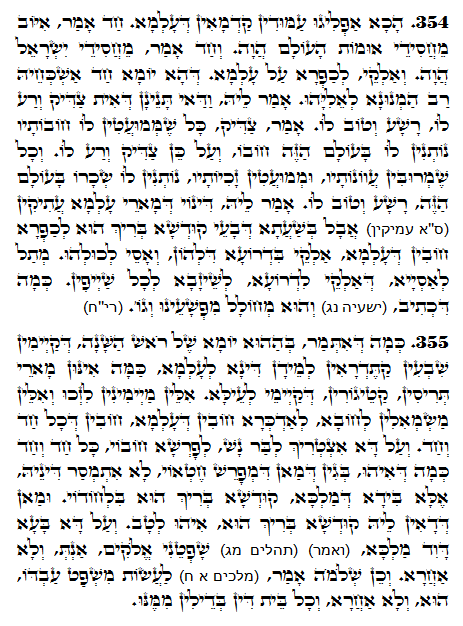Daily Zohar # 1195 – Pinchas – Merciful judge
Daily Zohar 1195
Daily Zohar 1195
Zohar Pinchas, Vol. 20 (English)/Vol 15 (Hebrew)

Hebrew translation:
355. כְּמוֹ שֶׁנֶּאֱמַר בְּאוֹתוֹ יוֹם שֶׁל רֹאשׁ הַשָּׁנָה, שֶׁעוֹמְדִים שִׁבְעִים כִּסְאוֹת לָדוּן דִּין הָעוֹלָם, כַּמָּה הֵם בַּעֲלֵי מָגִנִּים, קָטֵגוֹרִים, שֶׁעוֹמְדִים לְמַעְלָה. אֵלּוּ מַיְמִינִים לִזְכוּת, וְאֵלּוּ מַשְׂמִאלִים לְחוֹבָה לְהַזְכִּיר חוֹבוֹת הָעוֹלָם, חוֹבוֹת שֶׁל כָּל אֶחָד וְאֶחָד. וְעַל זֶה צָרִיךְ הָאָדָם לְפָרֵשׁ חוֹבוֹתָיו, כָּל אֶחָד וְאֶחָד כְּמוֹ שֶׁהוּא. מִשּׁוּם שֶׁמִּי שֶׁמְּפָרֵשׁ חֶטְאוֹ, לֹא נִמְסָר דִּינוֹ אֶלָּא בִּידֵי הַמֶּלֶךְ, הַקָּדוֹשׁ בָּרוּךְ הוּא בִּלְבַדּוֹ. וּמִי שֶׁדָּן אוֹתוֹ הַקָּדוֹשׁ בָּרוּךְ הוּא – הוּא לְטוֹב. וְעַל זֶה בִּקֵּשׁ דָּוִד הַמֶּלֶךְ (וְאָמַר), (תהלים מג) שָׁפְטֵנִי אֱלֹהִים. אַתָּה, וְלֹא אַחֵר. וְכֵן שְׁלֹמֹה אָמַר, (מלכים-א ח) לַעֲשׂוֹת מִשְׁפַּט עַבְדּוֹ. הוּא, וְלֹא אַחֵר. וְכָל בֵּית דִּין מִתְרַחֲקִים מִמֶּנּוּ.
Pinchas 354, 355
Psalms 43:1
“שָׁפְטֵנִי אֱלֹהִים, וְרִיבָה רִיבִי– מִגּוֹי לֹא-חָסִיד”
“Be Thou my judge, O God, and plead my cause against an ungodly nation;”
Job went through a complete Tikkun process in his life time.
The Zohar brings his story as an example and explanation to the spiritual correction system.
The most confusing aspect is that we see wicked people living good lives (materially) and righteous people with great sufferings.
The Zohar explains that the righteous that has very little impurities receives the Tikkun in this world in order to prepare and cleanse him from the world to come. The wicked may have a few good actions and they are rewarded in this temporary world.
The physical pain and the feeling of lack are just methods to cleanse the soul from impure attachments. Purity is a disconnection from the dependency on the material world. There are many rich and righteous people that may have a lot of money but in their consciousness they know that it is a tool in their hands to do good for others. They conduct their business affairs with honesty and with win-win aspect for all sides in all of their deals.
Some righteous people suffer beyond their personal cleansing for the sake of the global Tikkun. God gives them opportunity to ‘invest’ more of their lifetime to help the world around them.
The whole creation is one and is governed by one spiritual system. Every element in it is part of one body, one whole. When one has a major headache his entire body suffers, when the head is treated and the pain is gone the whole body is back in shape. That is why God moves the pain of the world to the righteous people that are the ‘head’ of the people. They can handle the pain and work on the remedy with their spiritual connections.
Job was an advisor to Pharaoh and had a great family and everything else. He lost everything, but after all the sufferings he was born again and got a new and better life than what he had before. We may go through sufferings but we should know that our soul will reap the reward in our current body or the next one. The work and sufferings in this world is just a TEMPORARY discomfort for the soul.
We should never see the suffering of a good person as a ‘punishment’/correction for something wrong that he may have done. Never judge others because when we do so we first bring judgment on ourselves.
Like in the Psalms verse above, we want to be judged by God because he knows everything and his judgment is always with mercy.
{||}

 Previous: Pinchas
Previous: Pinchas
